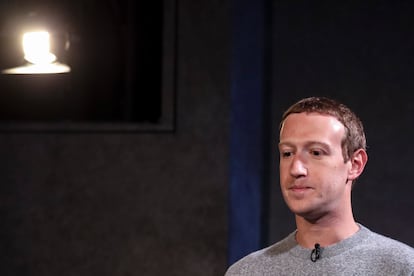Archiving Facebook: What happens to humanity’s data when all the users have gone?
The first-ever drop in the number of the social platform’s users marks a turning point in our online existences. What will mankind’s largest digital cemetery look like, and who will be able to access it?

Luciana Demaría Artola inherited one of the largest funeral homes in Uruguay, and a few months ago tweeted to offer help to the families of deceased Facebook users. “If you have a loved one who has passed away, write to me and I will help you create a memorial account or deactivate their profile. Don’t suffer,” she posted on Twitter. “It got a lot of reactions,” Artola explains over the phone. Because of her background in communication and family traditions, she specializes in helping people turn a Facebook account into a memorial: “It all started when a French friend of mine’s brother died years ago. She told me how horrible it was that the profile was still active and it would alert her that it was his birthday,” Artola says.
Over time she realized that this task could become part of the family funeral business. With the majority of us on one social network or another, digital burial will become just another step at the end of our lives. “A 21-year-old recently passed away and was buried by a competing funeral home, but they told him there that I knew how to close the social media accounts. The mother came and told me to do it because she couldn’t stand it anymore,” she explains. “The saddest thing I see is that a lot of people don’t know when the person has passed away. They write to them: ‘Hey how are you, it’s been a while!’”
Death has largely escaped digitization, but on a recent Meta call with investors, the parent company of Facebook announced a global drop in daily active users for the first time. This was once unthinkable, but new competition from TikTok and Meta’s increasing focus on the so-called metaverse means that in a few decades Facebook will host more dead users than living. The profiles and posts of the deceased will sit suspended in one big digital graveyard – the largest cemetery in the history of mankind.
Professor Carl Öhman of Sweden’s Uppsala University did the math in a 2019 scientific paper, and his most conservative numbers suggest the dead will outnumber the living on Facebook in about 50 years, he says. It may be sooner. “The exact number of dead people doesn’t matter so much,” he explains by email. “What matters is that it will be on a large scale. In the next three decades, 2.2 billion people will die. Their data has to go somewhere. The problem is much bigger than just a question of what year Facebook will have more dead profiles than live ones – in fact, it’s bigger than Facebook. Ultimately, it’s about the long-term governance of the internet,” he adds.
Decline in young users
Meta is the most emblematic company of the social media era. Facebook is the world’s largest social network, with more than 2 billion monthly users, and Instagram (also owned by Meta) is second if you don’t count YouTube. The average age of Facebook users skews older than other platforms, something that CEO Mark Zuckerberg admitted in October was a problem for its viability: “Over the last decade as the audience that uses our apps has expanded so much and we focused on serving everyone, our services have gotten dialed to be the best for the most people who use them rather than specifically for young adults,” he said.
Facebook’s obsolescence looms. “It’s a medium-term problem,” Öhman says. “That’s why so few people talk about it. It’s not a major concern in the next five years, but not hundreds of years away either. Technology people like to talk about things that revolutionize the industry in an instant or science fiction things that will happen in centuries. But what’s really important is what’s going to happen in the medium term, in 20 to 60 years from now,” he adds.
Meta is the only major company that has created “memorial accounts” for the deceased, both on Facebook and Instagram. When someone dies, next of kin or someone like Luciana Demaría Artola sends over a request along with proof of death, and Facebook changes the account settings. Posts remain visible and you can write on the person’s wall to remember them, but followers no longer receive birthday alerts or signs of activity. Twitter, YouTube and TikTok only offer an option to deactivate the account, and TikTok has such a young audience that on the request form death has no category of its own. You have to hit the “other” option, say company sources.
Lack of legislation
The challenges of this great digital cemetery are not limited to relations between family members and Meta. Facebook will host a substantial part of the intimate history of the first half of the 21st century on its servers. Who does that information belong to? What kind of access will great-grandchildren or historians have? What archives will remain from our era? And how will it respect the privacy of the deceased?
European data protection legislation does not cover the dead – for now at least. In Spain, the Data Protection Act states that relatives of the deceased may request access to, rectification or deletion of their personal data. All of this depends, of course, on Meta continuing to exist and for Facebook to stay up and running. “I worry about the lack of legislation,” says law professor Natalie Lynner of Drake University in Iowa. “Companies are free to create their own rules and policies regarding the death of a user, and they vary widely,” she says.
Questions remain about what benefit could be derived from reading your ancestors’ social media posts and messages. “Platforms will reinvent themselves to adapt to market forces. Users wanted to see the Facebook pages of their loved ones, so Facebook started allowing memorial pages. I imagine Facebook is working to generate new ideas to make up for the loss of users and add more activity to the platform,” adds Professor Lynner.
Richard Whitt, a former Google employee and now president of the California-based Glia Foundation, suspects companies will be driven by profit, not service to society: “Too many of these companies are only financially motivated. Can they be trusted to serve our best interests, especially for several generations? What are the odds that these companies will survive for 30, 40, 50 years to be around to provide ‘digital graveyard’ services?” he asks.
Perhaps there is another viable option for these companies once the dead outnumber the living. They may value the ability to predict the behaviors of grandchildren based on their grandparents’ Facebook activity. “You can mine the data of deceased people for information about their living descendants,” Öhman says. “I may not have any data about you, but if I know everything about your parents, I can make qualified inferences,” he adds.
Whose past is it anyway?
The fight over access to personal data is one of the most important of our age. “Whoever controls the past also controls the present. If Facebook and Google gain a monopoly on our digital past, we put ourselves at risk as a society. Not because the people working there are bad people, but because no institution should have that much power over how we relate to the past,” says Öhman. The debate doesn’t end there. If a historian in 2070 wants to study #BlackLivesMatter or the #MeToo movement against sexual harassment, the information on Facebook will be valuable. But where will it be and who will it belong to? Öhman proposes creating a Digital World Heritage label, similar to UNESCO’s for culture matters. For those who say that the internet is just junk, Öhman reminds us how part of our knowledge of ancient civilizations comes from their garbage.
There is another option besides open access data. “As [American internet pioneer] Vint Cerf, my mentor and friend, says, our ancestors may end up knowing less about the early 21st century than we do about the early 20th,” notes Whitt. “It will take a concerted effort, through business models and data technologies and government policies to ensure digital preservation.” A British company called Emortal is beta testing and crowdfunding digital archives that preserve the digital legacy of families through the ages, outside the reach of software and platform upgrades. Cerf himself has theorized about digital obsolescence or “bit rot.”
Emortal would allow you to have a folder on your desktop where each user uploads what they want to leave for posterity. “If you want to keep posts, for example, from Instagram, that’s something that’s pretty sure to be lost because no one will save them,” says founder Colin Culross. “None of them, particularly those businesses, will be around. There’s no guarantee that any of it will exist. It will all disappear,” he adds. This method ensures the preservation of digital files, but they remain only in the hands of the user’s heirs. A global solution, however, remains more complex.
Tu suscripción se está usando en otro dispositivo
¿Quieres añadir otro usuario a tu suscripción?
Si continúas leyendo en este dispositivo, no se podrá leer en el otro.
FlechaTu suscripción se está usando en otro dispositivo y solo puedes acceder a EL PAÍS desde un dispositivo a la vez.
Si quieres compartir tu cuenta, cambia tu suscripción a la modalidad Premium, así podrás añadir otro usuario. Cada uno accederá con su propia cuenta de email, lo que os permitirá personalizar vuestra experiencia en EL PAÍS.
¿Tienes una suscripción de empresa? Accede aquí para contratar más cuentas.
En el caso de no saber quién está usando tu cuenta, te recomendamos cambiar tu contraseña aquí.
Si decides continuar compartiendo tu cuenta, este mensaje se mostrará en tu dispositivo y en el de la otra persona que está usando tu cuenta de forma indefinida, afectando a tu experiencia de lectura. Puedes consultar aquí los términos y condiciones de la suscripción digital.









































